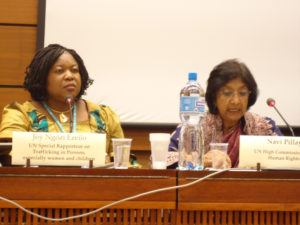Disclaimer: This article is more than 12 years old, and may not include the most up-to-date information or statistics. Please verify information with more recent sources as needed, and if you have any questions contact our Press Office.
31 May 2011

The UN High Commissioner for Human Rights, Ms Navi Pillay has called for greater access to compensation for trafficking victims. Speaking in Geneva today (Tuesday 31 May 2011) at a panel-discussion on the issue, Ms Pillay said: “One of the greatest challenges to human rights protection is access to justice and compensation. The challenge is to make the existing norms a reality for victims of trafficking.”
Ms Pillay spoke at a panel discussion organised by Anti-Slavery International and La Strada International, with the support of the OSCE/ODIHR and the permanent mission of Germany and the Philippines. The panel discussion was a side event to the UN Human Rights Council 17th Session as part of the international COMP.ACT campaign (European Action for Compensation for Trafficked Persons).
Calls for increased attention to access to justice and compensation were also raised by the President of the Council of Europe’s expert group on trafficking (GRETA) and the OSCE/ODIHR senior trafficking advisor as well as by the German and Philippines ambassadors to the UN.
In her keynote address, the UN Special Rapporteur on Trafficking in Persons, Ms Joy Ngozi Ezeilo, said: “It is a state obligation to ensure access to justice and effective remedies.” Ms Ezeilo made her comments ahead of the formal presentation of her thematic report on effective remedies for trafficked persons to the Human Rights Council tomorrow (Wednesday 1 June 2011).
Trafficking in human beings is a serious human rights violation. People trafficked into forced labour or sexual exploitation are subjected to abuse, exploitation, physical and psychological violence, forced to work long hours with little or no pay, under inhuman working and living conditions.
The United Nations estimate that the annual profits from the global trafficking industry to be $32 billion. According to the US State Department’s 2010 Trafficking in Persons report, across the world 49,105 people were identified as trafficked in 2009 but only a handful of individuals ever received compensation for their suffering.
While compensation is technically available for trafficked people in Europe under the terms of the Council of Europe’s Convention on Action against Trafficking in Human Beings, very few trafficked persons claim compensation and even less actually receive compensation.
Compensation acknowledges the extreme violation of rights and injustice inflicted upon trafficked people and their pain and suffering, as well as their material losses, and constitutes a first step towards overcoming the harm done. It is a very effective tool to help trafficked people rebuild their lives and ensures they receive wages which withheld as a consequence of exploitation.
The main obstacles to compensation are a lack of awareness and knowledge amongst professionals and authorities, limited and conditional compensation funds, as well as a failure to confiscate the assets of traffickers, the non-payment of court-ordered compensation money and a lack of jurisprudence.
Marieke van Doorninck of La Strada International, said: “Compensation for trafficked persons is crucial in the fight against trafficking, not only as an instrument of restorative justice and as prevention of re-trafficking, but also as recognition by the States of the violation of the rights and the damages trafficked people have suffered – after all, cash is an effective remedy.”
Klara Skrivankova of Anti-Slavery International said: “Governments must remove the obstacles preventing trafficked people from accessing compensation and rights. Although acknowledged as a right, effective remedies for trafficked persons remain merely a theory. It is time to make them a reality.”
Mariana Katzarova of the Office for Democratic Institutions and Human Rights of the Organisation for Security and Cooperation in Europe, said: “Compensation for trafficked persons is a basic human rights issue, centred on a human being entitled to reclaim their dignity and rights through justice being carried out.”
For further media information contact: Paul Donohoe, Anti-Slavery International: +44 20 7501 8934, +44 7779 624385 p.donohoe@antislavery.org
Notes for editors
1. COMP.ACT is a coalition of NGOs, trade unions and legal practitioners from 14 European countries* that combines practical work, including research, test cases and the development of guidelines for professionals, with international advocacy and campaigning for access to justice and right to redress for trafficked people. *(Austria, Belarus, Bosnia & Herzegovina, Bulgaria, Czech Republic, Germany, Ireland, Italy, Macedonia, Moldova, Poland, Spain, Ukraine and United Kingdom).
2. COMP.ACT campaign is institutionally supported by the Council of Europe and the Organization for Security and Co-operation in Europe (OSCE/ODIHR).





